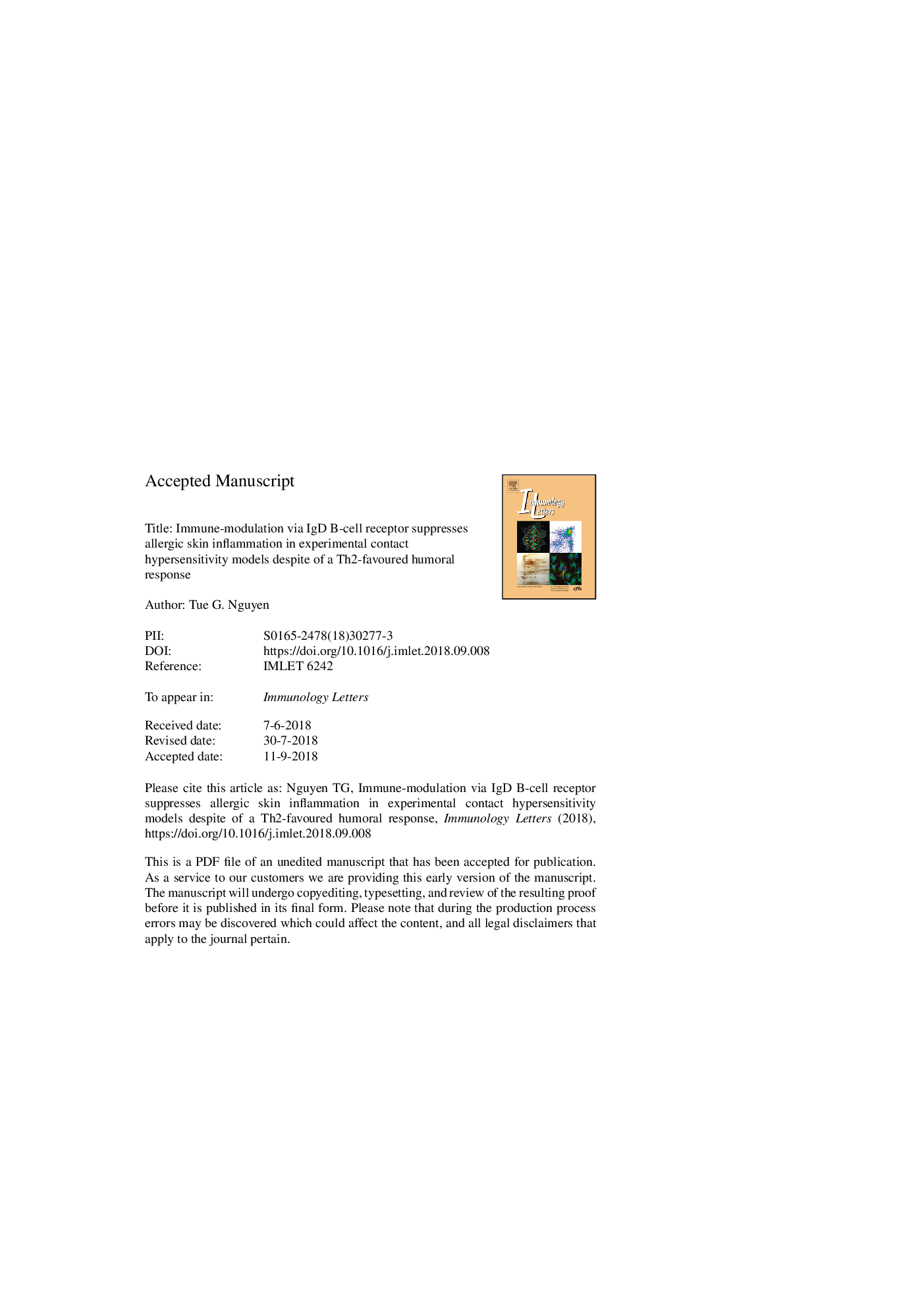| کد مقاله | کد نشریه | سال انتشار | مقاله انگلیسی | نسخه تمام متن |
|---|---|---|---|---|
| 10218499 | 1688049 | 2018 | 34 صفحه PDF | دانلود رایگان |
عنوان انگلیسی مقاله ISI
Immune-modulation via IgD B-cell receptor suppresses allergic skin inflammation in experimental contact hypersensitivity models despite of a Th2-favoured humoral response
دانلود مقاله + سفارش ترجمه
دانلود مقاله ISI انگلیسی
رایگان برای ایرانیان
کلمات کلیدی
IGDmAbBCRTMACHSHRPCD40LImmunoglobulin DDNCBACDTregFcRsMonoclonal antibody - آنتی بادی مونوکلونالTrimellitic anhydride - آنیدرید تریلیتیBAFF - بافBreg - برگیContact hypersensitivity - تماس با افزایش حساسیتAtopic dermatitis - درماتیت آتوپیکAllergic contact dermatitis - درماتیت تماس آلرژیکregulatory B cells - سلول های تنظیم کننده BRegulatory T cells - سلولهای تی تنظیمکنندهB-cell activating factor - عامل فعال کننده سلول BB cell - لنفوسیت بیCD40 ligand - لیگاند CD40Horseradish peroxidase - پراکسیداز هوررادیشPsoriasis - پسوریازیسB-cell receptor - گیرنده سلول BFc receptors - گیرنده های Fc
موضوعات مرتبط
علوم زیستی و بیوفناوری
ایمنی شناسی و میکروب شناسی
ایمونولوژی
پیش نمایش صفحه اول مقاله

چکیده انگلیسی
Atopic dermatitis (AD) and allergic contact dermatitis (ACD) are common skin inflammatory conditions. B and T cells are strongly implicated in allergic contact hypersensitivity (CHS) conditions. Activation of IgD B-cell receptor (BCR) by anti-IgD stimulation depletes mature B cells and modulates T-helper cell type 1/2 (Th1/2) responses in vivo. It is not known whether these effects by anti-IgD exacerbates or ameliorates chronic skin inflammations. This study investigated the effects of anti-IgD and B-cell depleting anti-CD20 antibody on skin inflammation in CHS murine models. Chronic CHS were induced by challenges with allergens trimellitic anhydride (TMA) or 2,4 dinitrochlorobenzene (DNCB). Mice were treated with an anti-IgD or anti-CD20 at various time-points following allergen challenges. This study revealed that early therapeutic treatments with anti-IgD at 4âh after allergen challenge significantly reduced skin inflammation in both TMA- and DNCB-induced CHS models (Pâ<â0.05). In contrast, anti-CD20 treatment exacerbated skin inflammation in DNCB-induced CHS despite of an extensive B cell depletion (Pâ<â0.05). Anti-IgD treatment depleted mature CD19+IgD+ B cells but enhanced allergen-specific IgM and total IgE productions, suggesting a Th2-favoured humoral response. Anti-IgD reduced neutrophilic infiltrations but increases accumulation of mast cells in dermal tissues. The anti-inflammatory effects of anti-IgD were supported by evidence of an increase in the percentage of regulatory B cells and T cells. Collectively, this study demonstrates that immune-modulation by anti-IgD treatment suppresses Th2-mediated allergic skin inflammation in murine models despite a skew toward a Th2-favvoured humoral response and therefore may present a novel treatment for chronic human AD and ACD.
ناشر
Database: Elsevier - ScienceDirect (ساینس دایرکت)
Journal: Immunology Letters - Volume 203, November 2018, Pages 29-39
Journal: Immunology Letters - Volume 203, November 2018, Pages 29-39
نویسندگان
Tue G. Nguyen,